School closures latest: I would let family sit under propped-up concrete ceiling, says minister
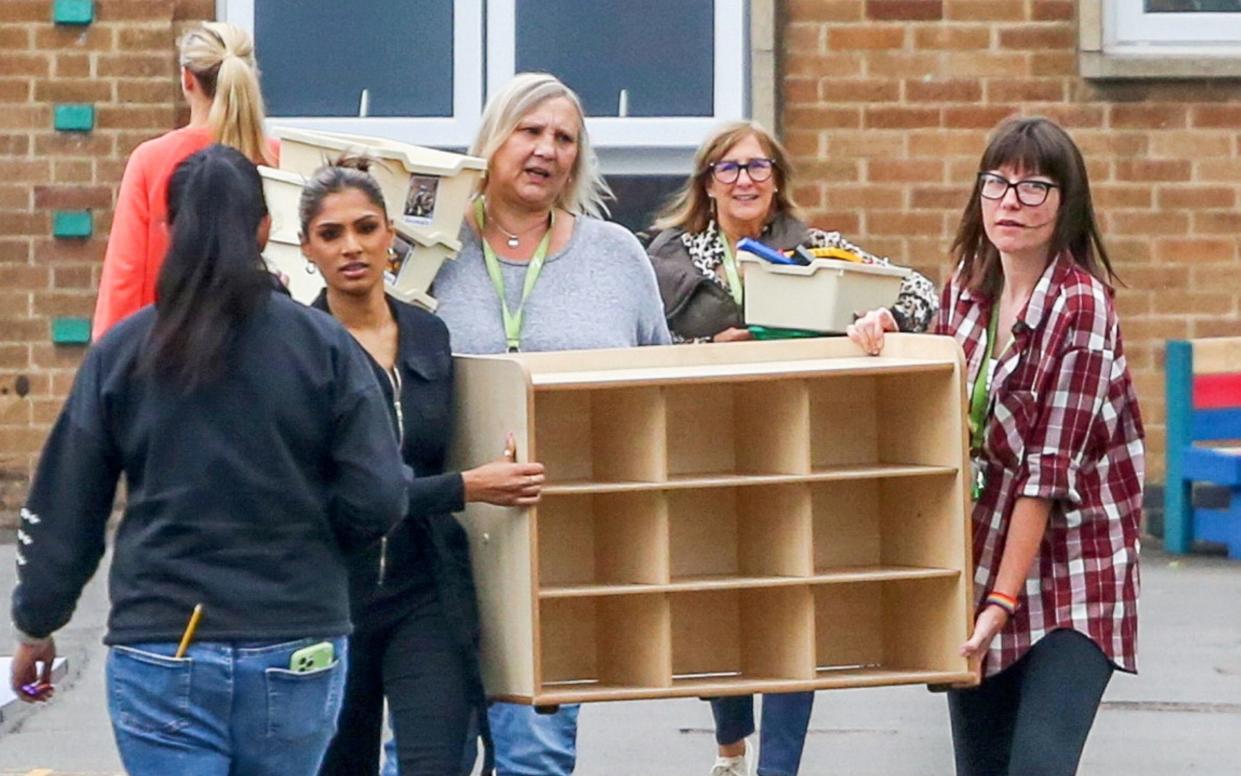
- Oops!Something went wrong.Please try again later.
A schools minister said he would be happy for his nieces and nephews to sit under a classroom ceiling propped up by beams to keep it standing.
Nick Gibb’s comments came as more than 150 schools in England have been identified as having a type of concrete prone to collapse, with many now closing buildings or classrooms to make them safe.
Reinforced autoclaved aerated concrete is a building material used in the latter half of the 20th century, but is now assessed to be at risk of collapse.
Speaking to LBC’s Nick Ferrari programme, Mr Gibb expressed his confidence in the precautionary measures being taken to ensure the safety of students in schools affected.
Some of the measures include schools having their ceilings propped up with steel girders.
Asked if he would be happy to see his young nieces and nephews to sit in a classroom under a ceiling propped up by a steel girder, Mr Gibb said: “Yes, because we’re taking a very precautionary approach.”
04:01 PM BST
Thank you for following The Telegraph's concrete school closures live blog
The Telegraph’s live blog coverage of concrete school closures has concluded.
Please keep up to date with our further coverage in the app, online and in print.
03:52 PM BST
RAAC floating in water
03:35 PM BST
Special needs children missing out on school is 'awful', councillor says
Children will miss lessons at a special educational needs school after RAAC was found to have been used in its construction.
Lydia Hyde, Labour and Co-operative Party councillor for Southend-on-Sea Borough Council, said the situation was “awful” and a plan should have been made in March when the school was first inspected.
She added: “The main building of the school has been affected, no-one can go in it, it’s riddled with the stuff unfortunately.
“It’s a special educational needs school, there’s special equipment in there, some customised for certain children, at the moment we can’t get to that.
“We know that it’s going to be closed for at least the next week, we don’t know beyond that.
“It’s the right decision that the children aren’t going back to this school as it is unsafe, this should have been sorted out months ago, the Local Government Association has been warning the Government for a long time.
“The school was first inspected in March, that’s when a plan should have been made, but that hasn’t happened.”
02:58 PM BST
Why RAAC fails when it gets wet
02:33 PM BST
Students at special needs school 'thrown into chaos'
Parents of children with special needs were called just days before the start of the new term to be told their school had to shut as it is fitted with a concrete that could suddenly collapse.
Louise Robinson, headteacher of Kingsdown School in Southend, Essex, called parents of students, who are aged between three and 14 and have severe learning difficulties, profound and multiple learning difficulties, physical disabilities and associated learning difficulties, on Thursday to tell them the news that the school will be closed next week due to the aerated concrete.
It comes amid chaos across the country as 104 schools and colleges have been told by the Department for Education (DfE) to partially or fully close buildings just as students prepare to return after the summer holidays.
02:10 PM BST
Nick Gibb: some say we are being over-cautious
A schools minister said he would be happy for his nieces and nephews to sit under a classroom ceiling propped up by beams to keep it standing.
Asked on LBC if he would be happy to see his young nieces and nephews to sit in a classroom under a ceiling propped up by a steel girder, Nick Gibb said: “Yes, because we’re taking a very precautionary approach.
“Some say we are being overcautious in dealing with this. But the advice is you can prop up these beams. Where they are in a more dangerous condition, of course, we take that room out of use altogether.
“And that’s the work that’s happening with a case worker, with support from the department, in those 156 schools, and we continue to work to identify Raac throughout the school system.
“There’s no country in the world where you can be as assured, as in this country, that you have a government that is on top of this issue and is doing everything to identify where Raac is and take action when we think it is unsafe for pupils.”
01:51 PM BST
RAAC in at least 37 schools in Scotland
Figures obtained by the Scottish Liberal Democrats in May revealed the crumbly concrete substance behind the closure of more than 100 English schools was present in at least 37 schools in Scotland.
The data showed the light and bubbly form of precast concrete was present in nine schools in Dumfries and Galloway, seven in Aberdeen, six in Clackmannanshire and five in West Lothian.
Two schools in Dundee, the Highlands and North Lanarkshire were also found to contain the material, as well as single schools in Aberdeenshire, Argyll and Bute, East Lothian and Perth and Kinross.
Guidance from the Institution of Structural Engineers instructs the material to be replaced only if it is deemed to be in a poor condition and is considered a high risk, otherwise it can be managed in place.
The Scottish Government said local authorities are currently undertaking reviews of the presence of RAAC in public buildings in Scotland, including schools and hospitals.
01:40 PM BST
What is happening in devolved nations?
The possible presence of the concrete was being assessed in Scotland, Northern Ireland and Wales, where education is devolved.
The Welsh Government said councils and colleges have not reported any presence of Raac.
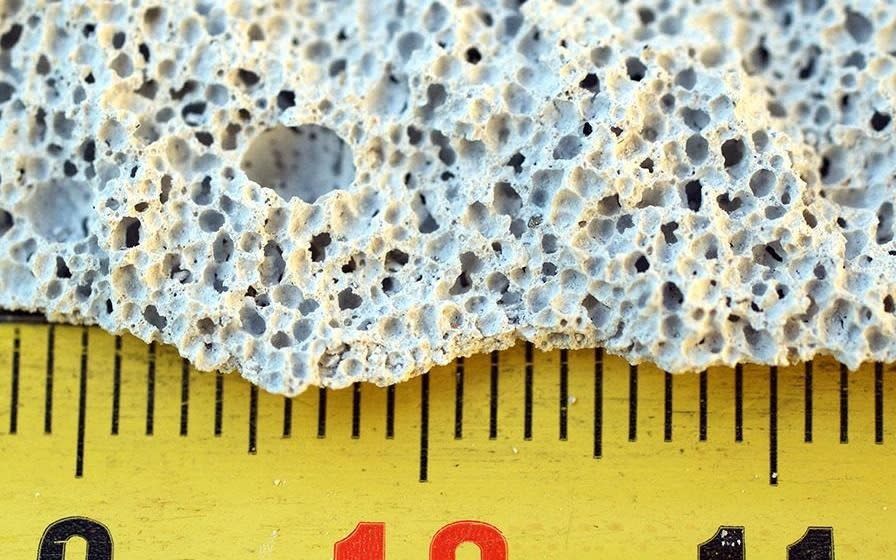
01:21 PM BST
Hospitals are safe, Nick Gibb insists
When asked by the BBC if hospitals are safe, schools minister Nick Gibb said: “Yes, they are. Hospitals are very large buildings. They have big and expert maintenance teams in those hospitals.
“They can use propping, and they are using propping so they can move patients from one ward to the other.
“It’s a very different estate from the school estate.”
Raac planks are thought to be present in 34 hospitals’ buildings in England.
The Government launched its New Hospitals Programme in 2020 pledging to build 40 new hospitals by 2030.
However, a report by the public spending watchdog in July said it is on track to break a key promise in the blueprint.
The National Audit Office (NAO) found delays in projects mean the target is not likely to be met.
By the watchdog’s analysis, 32 hospitals in England classed as new by the definition the Government first used are set to be completed in 2030.
01:07 PM BST
NHS 'welcomes' Government action on RAAC
Sir Julian Hartley, chief executive of NHS Providers, said the organisation “welcomed” recent Government action, but called for all trusts to have access to cash to replace Raac where necessary.
“We welcomed recent government action to replace dangerous, crumbling old concrete blocks in ceilings and walls by ensuring the seven trusts with the most critical Raac risk will be replaced by 2030,” he added.
“The Government has made a commitment that the remaining Raac risk will be removed from the NHS estate by 2035.
“However, it is vital that all trusts can access the necessary capital funding to replace these concrete planks as soon as possible.”
12:52 PM BST
All NHS trusts must have access to funding to replace unsafe RAAC concrete, health chiefs say
All NHS trusts should have access to the necessary funding to replace concrete that has been deemed unsafe “as soon as possible”, a health chief has said.
The Government has committed to rebuilding seven hospitals most affected by reinforced autoclaved aerated concrete (Raac) by 2030.
The lightweight material was used in public buildings from the 1950s up to the mid-1990s, but is now assessed to be at risk of collapse.
12:20 PM BST
Costs guidance made clearer
Ministers have dropped guidance suggesting schools and councils would have to fund the costs of temporary classrooms as they relocate over crumbling concrete.
Schools minister Nick Gibb sought to dampen some of the anger on Friday by confirming that the Government would pay for the makeshift measures.
He sought to blame the National Education Union (NEU) for having “misinterpreted the guidance” issued by the Department for Education (DfE).
But the official document issued to schools by the DfE had been made clearer.
It no longer says that local authorities and academy trusts would be expected to fund “rental costs for emergency or temporary accommodation for education settings”.
Mr Gibb told BBC Radio 4’s Today programme: “We’re going to clarify the guidance because of their misinterpretation, we are paying for those costs.
“If in the worst case scenario a school does have to close and we put Portakabins into the grounds, all that cost will be covered by the department.”
12:11 PM BST
Northern Irish schools to be checked 'as a matter of urgency'
Schools across Northern Ireland are to be checked urgently for the presence of a concrete that could suddenly collapse, the Department of Education has confirmed.
More than 104 schools and colleges in England are to be placed in temporary accommodation amid the presence of reinforced autoclaved aerated concrete (Raac).
The material is a lightweight concrete used from the 1950s up to the mid-1990s which is being assessed after it was linked to the collapse of the roof at Singlewell Primary School in Kent in 2018.
Schools in Northern Ireland are to be contacted about structural surveys to determine the extent of the presence of Raac.
A spokesperson for the Department of Education told the PA news agency: “The Department of Education has commissioned the Education Authority to carry out structural surveys to ascertain the extent to which Raac may be present in schools across Northern Ireland.
“This work is being taken forward as a matter of urgency to ensure that any necessary mitigations are put in place promptly.
“Schools will be contacted by the Education Authority as work progresses.”
11:55 AM BST
Angry parent: Why are we only just finding out?
Phil, whose children were due to return to primary school in Essex next week, said he was only informed about school closures on Thursday.
He told the BBC: “If you remember the issues parents had during the pandemic it will mean just more upheaval or disturbance for the children.
“We both work full-time so it’ll just be sort of juggling workloads. But it’s more maintaining the children’s attention.
“They’re eight and 10, so as you remember from the pandemic, just maintaining that concentration.
“It’s just not as good as face to face learning.”
He added that it was “just frustration as to why it’s been done three days before the school term.”
He said: “Having read the BBC news reports over the afternoon, I understand there was a report done back in June and you just wonder why we’ve had six weeks holiday, why couldn’t plans have been put in place prior to this?
“Three days before the start of term is just not good enough really.”
11:42 AM BST
'Only a small number of closures in the coming weeks'
Officials believe that only a “small number” of further schools will be told to make closures in the coming weeks once the surveyors complete their inspections.
Mr Gibb insisted “we took the decision as soon as the evidence emerged” as ministers faced anger for telling schools of the closures only days before children start the autumn term.
He said “over the summer” they discovered a number of instances where Raac that had been considered to be low risk “actually turned out to be unsafe”.
The minister told BBC Radio 4’s Today programme that a “beam collapsed” that had no external signs it was a “critical risk”.
It was unclear whether the collapse took place in a school in England.
11:36 AM BST
Welsh Government to survey schools
The Welsh government is to survey schools in the country to check if any were built using RAAC,
A Welsh government spokesperson told the BBC: “Local authorities and further education Institutions have not reported to us any instances of RAAC being present within schools or colleges.
“We have commissioned a survey of all state funded schools and colleges which will identify any structures suspected of containing RAAC.”
Welsh Conservative shadow education minister, Laura Anne Jones, said: “There is clearly a serious safety concern surrounding RAAC and any risk of injury to children here in Wales is completely unacceptable.
“The Labour education minister needs to urgently review the situation in Wales, follow the lead of the UK Conservative government and identify at-risk school buildings. We should not be on the backfoot for this.”
11:28 AM BST
Teaching union: Questions raised over safety of other schools
Dr Patrick Roach, genera secretary of the teaching union NASWUT told the BBC: “Whilst we believe that today’s decision is the right one... it will raise questions about the safety of other schools, the time it will take to complete detailed surveys of all schools at risk of RAAC, and whether the government could and should have done more to prevent this situation arising in the first place.”
11:19 AM BST
Which schools are affected?
Schools Minister Nick Gibb said on Friday that a full list of schools affected by RAAC, reinforced autoclaved aerated concrete, will be published in the afternoon.
The DfE is understood to have contacted more than 100 schools on Thursday to advise them to fully or partially close.
So-far, the local authority in Bradford revealed on Thursday that Raac was detected in Crossflatts Primary School and Eldwick Primary School in the West Yorkshire city.
Both interim and long-term alteration works are being carried out to ensure children can be accommodated on the two sites, according to Bradford Council.
The council said interim alterations to safe areas will be finished by Sunday and temporary classrooms on both school sites have been ordered and should arrive within the next 8-10 weeks at Crossflatts and 14-16 weeks at Eldwick.
Elsewhere, the BBC reports affected schools include Ferryhill School, a secondary in County Durham, Willowbrook Mead Primary Academy in Leicester and Corpus Christi Catholic Primary School in Brixton, south London.
11:10 AM BST
Staff help to remove furniture from affected school building
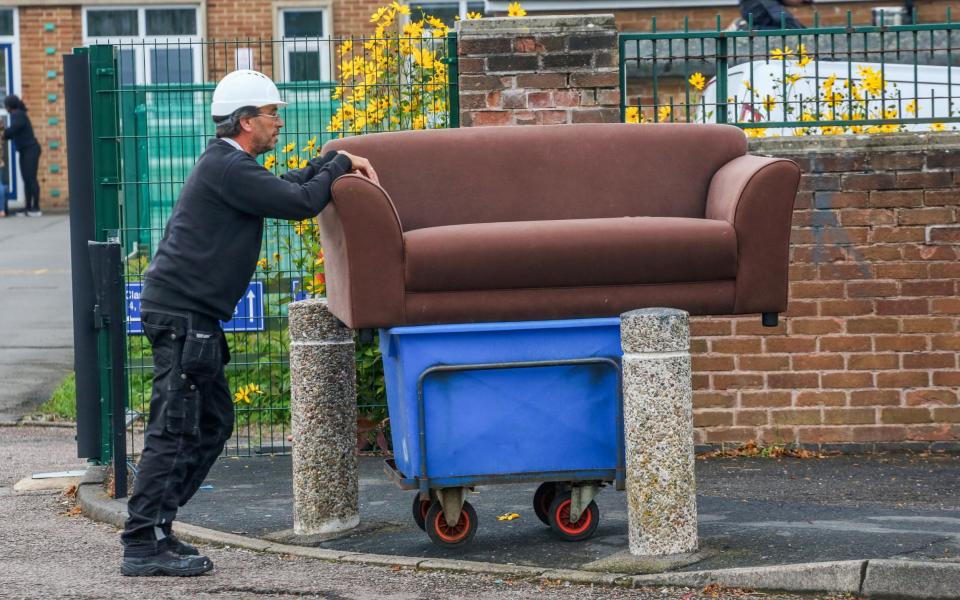
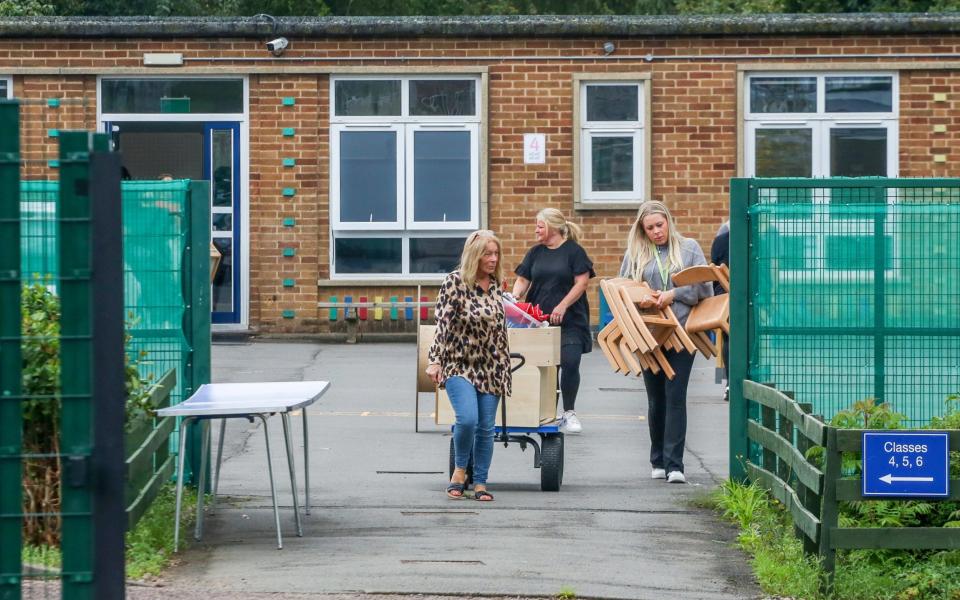
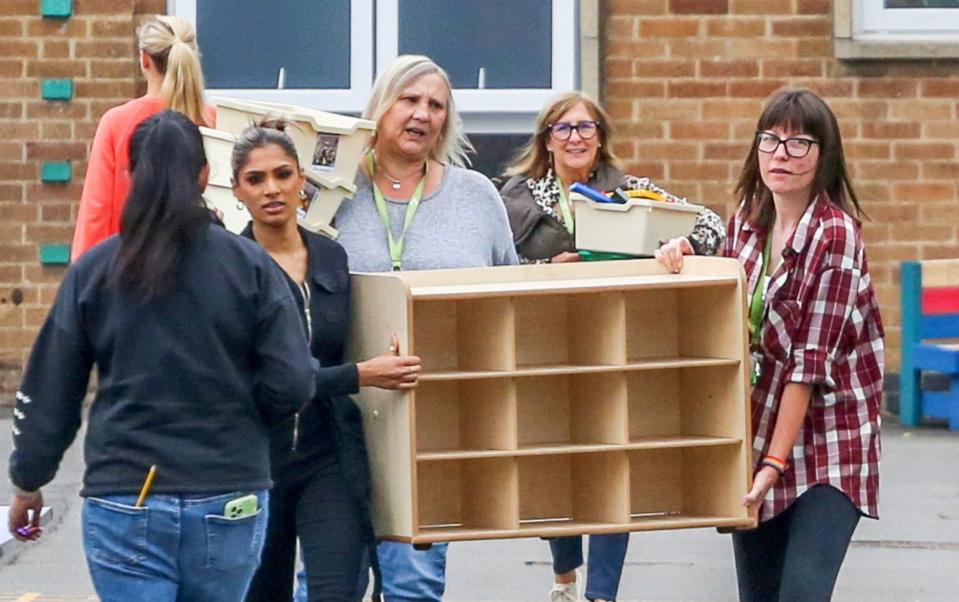
11:02 AM BST
Various schools closed in Essex
Schools with full or partial closure of buildings in Essex include:
Anglo European School - Progressing through the School Rebuilding Programme (SRP) process.
Bromfords School – The DfE will be completing temporary safety works (propping) in affected parts of the school to maintain safety until the schools rebuild is complete as part of the SRP. These safety works are planned to commence over the summer, and some temporary accommodation may be required on site for a short period of time.
Fitzwimarc School – Interim safety works to be completed over the summer. The academy and the DfE continue to work on determining the best long-term solution to the RAAC in the school.
Mistley Norman CE Primary – Arrangements have been made for the 2023/24 academic year for the children at the school to be housed at Two Village Primary, another nearby school within the academy trust. The DfE have visited Mistley Norman Primary and completed an initial assessment of the overall condition of the building to inform the long-term solution for the school, whether heavy remodelling and removal of RACC, or a rebuild of the school.
Hockley Primary – Temporary accommodation is being installed, commencing in the summer, to enable pupils to return to the school site. This will be in place until a suitable solution for RAAC in the permanent school building is identified and delivered.
Springfield Primary – Remedial works to make the RAAC areas of the school safe have commenced and will be completed by the end of September. Temporary classrooms are being installed in August to enable all pupils to return to the school site in September.
10:57 AM BST
Association of School and College Leaders statement on concrete scandal
Julie McCulloch, director of policy at the Association of School and College Leaders, said: “The danger of structural failure in school buildings where this type of concrete was used in construction has been known since at least 2018. The Department for Education’s own annual report last year identified the condition of school buildings as one of six ‘significant risks’ it was managing, describing this risk as ‘critical – very likely’ and ‘worsening’.
“It has taken the government far too long to act on a risk of this seriousness. The scramble now taking place to contact affected schools ahead of the imminent start of the new school year is clearly vital, but the actions these schools will need to take will be hugely disruptive, and this will obviously be worrying for pupils, families and staff. The government should have put in place a programme to identify and remediate this risk at a much earlier stage.
“The wider context is that the government has failed to invest sufficiently in the school estate over the past 13 years.
“The ‘useful life’ of this type of concrete – used from the mid-1950s until the mid-1990s – is only 30 years and it is symptomatic of this underinvestment in school buildings that the situation has had to become critical before anything is done.”
10:45 AM BST
Scottish schools to be assessed for presence of RAAC
The presence of collapse-risk concrete in Scottish schools is being assessed by ministers after the UK Government confirmed it will close more than 100 buildings due to the potentially harmful material.
Pupils at the 104 schools south of the border will be placed in temporary accommodation amid the presence of reinforced autoclaved aerated concrete (Raac).
The material is a lightweight concrete used from the 1950s up to the mid-1990s which is being assessed after it was linked to the collapse of the roof at Singlewell Primary School in Kent in 2018.
The Scottish Government has confirmed work is under way to fully understand the presence of Raac across the school estate in Scotland, with local authorities expected to prioritise remedial work.
10:27 AM BST
Hospitals rebuilt, partially rebuilt or closed over by RAAC
Two hospitals are now open to patients:
Northern Centre for Cancer Care – North Cumbria Integrated Care NHS Foundation Trust
Royal Liverpool Hospital – Liverpool University Hospitals NHS Foundation Trust
Five further hospitals are under construction, including:
Midland Metropolitan Hospital – Sandwell and West Birmingham Hospitals NHS Trust
Northgate Hospital – Cumbria, Northumberland, Tyne and Wear NHS Foundation Trust
Greater Manchester Major Trauma Hospital – Northern Care Alliance NHS Foundation Trust
3Ts Hospital – Brighton & Sussex University Hospitals NHS Trust
Bath Cancer Hospital - Royal United Hospital Bath NHS Foundation Trust
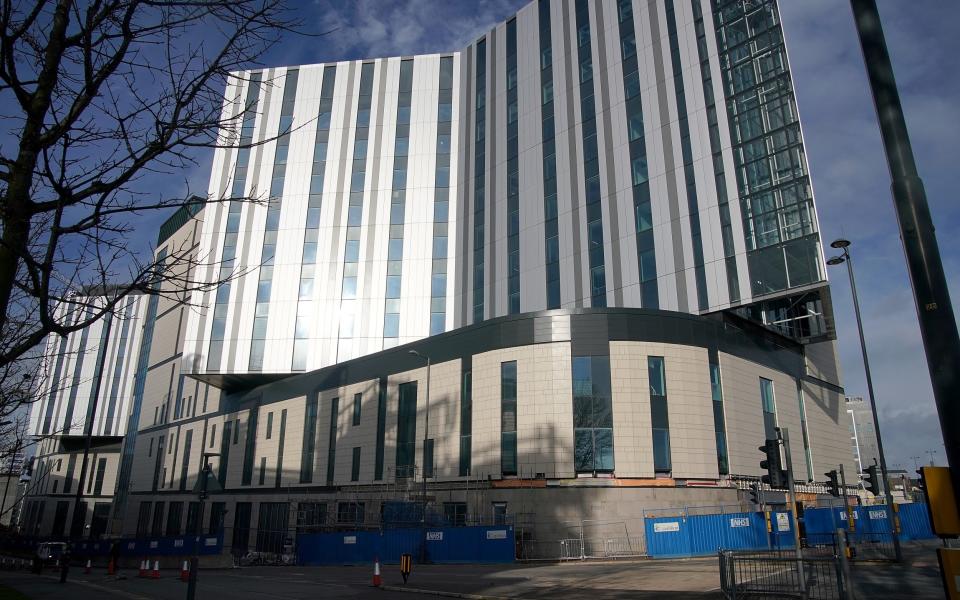
10:25 AM BST
'Imagine the fury of parents'
Shadow Justice Secretary Steve Reed said parents’ will be infuriated by the closures.
He told BBC Radio 4’s Today: “Just imagine the fury of parents up and down the country today.
“Finding out just days before the start of term ht their school is going to be closd=ed because the Government hasn’t done anything about a problem relating to this concrete that they have known about for years.”
09:53 AM BST
Beam collapse over summer holidays led to warning at 104 schools
Nick Gibb told the BBC: “A beam that had no sign... that it was a critical risk and was thought to be safe collapsed.”
The Schools Minister added a decision had to be made after “a number of instances” over the summer proved RAAC that was previously considered to be safe was, in fact, unsafe.
He said: “What we discovered over the summer was a number of instances, in schools and in non-schools, in England and outside England, where RAAC that had been considered to be a low risk actually turned out to be unsafe.”
09:43 AM BST
Forres Academy in Moray, north east Scotland, affected
In a letter from Moray council, parents and guardians at Forres Academy were told “a small number of classrooms” will be out of action.
Work is to be carried out on areas affected by RAAC, the letter said.
It states: “You may be aware of press coverage of late regarding public buildings across Scotland that have been reported as having Reinforced Autoclaved Aerated Concrete (RAAC) structures.
“As per expectation, regular surveys, over a number of years have been undertaken across the Moray Council property portfolio. We have one school which has RAAC components and this is Forres Academy.
“In April of this year we received further guidance issued by the Institution of Structural Engineers and as a result an invasive inspection took place over the summer period by a firm of Chartered Engineers who have the required expertise and experience to undertake RAAC assessments.”
09:26 AM BST
RAAC has been considered an issue since 2018
RAAC is a lightweight building material used from the 1950s up to the mid-1990s, but is now assessed to be at risk of collapse.
The DfE has been considering RAACas a potential issue since late 2018 but the timing of the decision to issue guidance just days before the start of term has angered unions.
National Education Union general secretary Daniel Kebede said: “It is absolutely disgraceful, and a sign of gross Government incompetence, that a few days before the start of term 104 schools are finding out that some or all of their buildings are unsafe and cannot be used.
“To add insult to injury the Government states in its guidance that it will not be covering the costs of emergency temporary accommodation or additional transport.”
09:17 AM BST
Nick Gibb on the morning media round

09:15 AM BST
Parents demand answers over why they were given such little notice
Parents have asked why schools were closed with such little warning.
One parent told MailOnline: “My son was supposed to be starting in his new school on Tuesday, however now we will be using Google classroom for the foreseeable future with no confirmed date of face-to-face teaching.
“The school state they were informed of the forced closure on August 29 at 4pm by the DofE and local council.
“We are extremely frustrated and our son is confused and disappointed.”
Another parent, dad Shahzad Ismail said he was “devastated” by the affect that the last-minute school closures would have on so many children.
He told the BBC: “Even the headteacher that sent that letter, you could tell from the letter how emotionally stressed out she was because it’s going to widely affect a lot of children.”
08:59 AM BST
Teachers: Where will we all go?
Zoe, a teacher at a school in south east England told the BBC: “Yesterday we hard the news that there are going to be eight classrooms deemed unsafe.... that is eight members of staff who don’t have permanent base.”
She said that in those areas the roof will also need to be replaced.
Questioning where all the pupils would go, the teacher added: “This is going to be a really tricky start on Monday.
“How is this going to work on a day-to-day basis?
“Two subject areas haven’t got a permanent teaching base in a school that’s already got over a thousand children.
“Where are we all going to physically go?”
08:54 AM BST
RAAC is 'life expired'
The Health and Safety Executive has declared RAAC (reinforced autoclaved aerated concrete) “life expired”.
A statement on the HSE website adds: “It is liable to collapse with little or no notice.
“If you are responsible for the management, maintenance or alteration of central and local government buildings you should know whether your buildings contain RAAC, and act appropriately to ensure that such buildings are safe.”
08:47 AM BST
Government will cover all costs
The Government will cover “all capital costs” over disruption to educational building from the use of a type of concrete prone to collapse, the schools minister has said.
Asked on Sky News who will pay if schools need to either fully or partially relocate, Nick Gibb said: “We will pay for that. We’ve made it very clear we will cover all capital costs.
“So if in the worst-case scenario, we need portacabins in the school estate for an alternative accommodation, we will cover all those costs.
“So there has been some speculation that we won’t cover those costs. We absolutely will.”
On whether all schools affected have now been informed, Mr Gibb said: “The vast majority have. We have been calling them yesterday, but there are a few more that we’re calling today, and those schools are now talking to parents about what’s going to happen in their school.”
Mr Gibb also said the Government will release a list of the schools in “due course”.
08:33 AM BST
More schools likely to close, schools minister says
Nick Gibb told GB News: “We are putting large amounts of capital into the school estate to improve the condition and, by the way, RAAC applies only in the period (between) the 1950s and the 1990s, so schools built or extended before that period or afterwards - which is about half the school estate - will not even need to consider whether they have RAAC.
“The issue is any extensions or schools built in that period, and that’s where we’ve been focusing our surveys and evidence-gathering since 2022, so we know where RAAC is in the school estate.
“It’s in 156 schools. There may be more after that as these questionnaires continue to be surveyed and we continue to do more surveying work.”
Asked if parents should worry during the wait for more survey results, Mr Gibb said: “No, they shouldn’t worry. Parents will be informed by the school. We were speaking to schools yesterday, some more today, and then schools are telling parents what action they are taking.”
He added: “We now are taking a cautious approach. It is a very cautious approach based on a number of cases that emerged over the summer.
“We are now saying that we think those buildings or rooms should be taken out of use. That’s a very cautious approach, so parents can be confident that if they’ve not been contacted by their school it is safe to send children back into school.”
08:30 AM BST
Cost of alternative arrangements for pupils is 'significant'
A head teacher whose school was closed earlier this year over RAAC-related issues said the costs of making alternative arrangements for pupils was “significant”.
Caz Evans of Parks Primary School in Leicester told the BBC: “We’re up to around £30,000 at the moment.”
She said costs related to bringing in containers, new toilets, and whiteboard stands had contributed to the bill.
08:21 AM BST
Court closed and seven hospitals affected by RAAC being rebuilt

The Government is rebuilding seven hospitals due to issues related to “extensive RAAC (reinforced autoclaved aerated concrete)”, the schools minister has said.
Asked on BBC Breakfast if other public buildings could be affected by that type of building material used between the 1950s and the mid-1990s, Nick Gibb said: “Right across the public sector, we are surveying the estate.
“You’ve heard of a court closing at Harrow. We are taking action, of course, in the hospital sector as well.
“Hospitals are very large buildings and they have teams of very expert maintenance people monitoring the building the whole time.
“They use propping where they identify RAAC and also we are rebuilding seven hospitals because of extensive RAAC in those hospitals.”
Meanwhile, Harrow Crown Court in north-west London was also closed last week after the potentially dangerous material was found.
08:15 AM BST
Roof cave in prompted mass closures
By Neil Johnston; Joe Pinkstone, science correspondent ; Riya Makwana; Catherine Lough and Louisa Clarence-Smith, education editor
It was the discovery of rubble in classrooms at a school thought to be safe that prompted the Government to take drastic action and halt the return from the summer holidays for thousands of children.
After years of inaction, the Department for Education went into panic mode when it found that planks of lightweight, bubble-like concrete previously considered a “non-critical” risk had caved in at one school “without warning”.
No pupils were inside but the collapse prompted the order for more than 100 schools to close their doors or shut crumbling classrooms over the risk posed by Reinforced Autoclaved Aerated Concrete (RAAC).
More closures are expected as an estimated 700,000 children are taught in dilapidated schools. Experts are already predicting a billion-pound headache for the Government.
08:09 AM BST
What is reinforced autoclaved aerated concrete (RAAC)?
By Joe Pinkstone, science correspondent
RAAC, or reinforced autoclaved aerated concrete, is a type of concrete widely used in buildings during the second half of the 20th century.
It was a common building material in public sector buildings between the 1960s and the 1980s, and was a popular choice for walls as well as roofs.
The raw materials are cement, blast furnace slag and pulverised fuel ash or silica flour, and these are mixed with water and aluminium powder.
However, the material has air throughout, which poses long-term durability concerns. Air inside the material makes it vulnerable to moisture, which causes its tensile strength to deteriorate, posing a risk of collapse.
The material can appear fine and suddenly catastrophically fail without warning.
08:01 AM BST
Calls to publish full list of affected schools
Opposition ministers have called for a full list of schools affected by RAAC in their buildings to be published.
The Department for Education (DfE) said a minority of the state facilities may have to move completely and some children may be forced back into pandemic-style remote learning.
Education Secretary Gillian Keegan told broadcasters: “Most parents should not be worried about this at all.”
But shadow education secretary Bridget Phillipson said: “We haven’t seen the full list of schools affected. We don’t know where they are, ministers should come clean with parents and set out the full scale of the challenge that we’re facing.”

